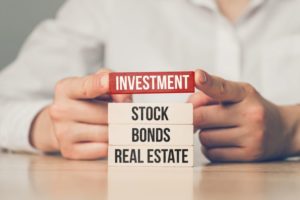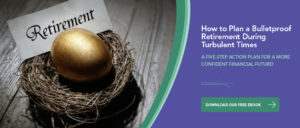Is Your Retirement Safe in Today’s Bond Market?
Between higher interest rates, inflation, and a tumbling stock market, it may feel like your retirement savings are in danger. So, is this a good time to get (or keep) invested in bonds? The short answer is “Not without doing your homework first.”
Let’s take a look at the state of the bond market. Once we have a working knowledge of the pros and cons, you can decide from there if bonds are still a safe investment for your retirement.
This article discusses these topics:
- The old 60/40 standby isn’t optimal now
- A comfortable retirement lifestyle isn’t guaranteed
- We can market-weatherize your retirement plan
- Heritage Capital, LLC: low-pressure, high value
The Old 60/40 Standby Isn’t Optimal Now
It’s been an ugly year. That’s no news flash, but it is an essential concept to start with. By some accounts, October brought the worst single day for stock and bond investors since 1969. The point I’m making here is that these are extremely unusual economic times.
The financial world is zigging where it normally zags and vice versa. Particularly for retirees, bonds have always been a no-brainer: At any other time, they have been a solid source of steady income. The conditions we’re seeing now are extremely rare.
Some would even say “unprecedented,” but that’s (debatable and) beside the point. When your car suddenly starts shuddering, philosophy can wait. What we need now is a basic understanding of what’s happening under the hood: For decades up to now, wealth managers have (wisely) suggested a 60/40 ratio, investing 60% in stocks and 40% in bonds.
You could practically set a clock by its dependability. At the time, it typically offered nice growth potential (due to your higher-risk stocks) paired with the bonds’ ever-stable protection.
Now that soaring, inflation-propelled interest rates are lowering the value of fixed-rate assets, bonds have seen wildly unusual losses this year. As a result, the 60/40 approach needs to be shelved for the time being.
A Comfortable Retirement Lifestyle Isn’t Guaranteed
There is still good news: Despite sometimes-gloomy economic forecasts, all is not lost. We just want to avoid Route 60/40 along the interstate journey to your financial goals. Thankfully, we have other possible roads to get you there.
However, before we consider those, this financial mechanic needs to tell you one more important thing: Cranking up your music or podcast and completely ignoring your monetary engine’s sounds is an especially bad idea now. As you read this, inflation is decreasing the purchasing power of your dollars. Even a high-net-worth individual cannot afford to ignore this (unless you’re tired of your wealth).
In other words, in the near future, a million dollars in savings may only be enough to buy what $800,000 will currently get you. That’s not a sure thing; only an example of where the economy could head before things start turning up again. The point I’m trying to make is that an enjoyable lifestyle now should not be taken as bankable proof of an equally comfortable retirement.
In saner times, investing is largely a waiting game. Today, meanwhile, sitting back in oblivion can shrink your nest egg. That could potentially diminish (not just your standard of living as a retiree, but) any wealth you want to leave future generations as a legacy. Please consider this a friendly word of warning.
Fed Up With Your Current Advisor? We Might Have Answers to Your Unresolved Questions
We Can Market-Weatherize Your Retirement Plan
Again—even if you currently hold a long position in bonds—as long as you don’t sit around until there’s smoke rolling out from under the hood, all is not lost. There are steps we can take to get your portfolio roadworthy again (if not humming along toward possible gains).
It starts with rebalancing, meaning that we need to diversify your assets: While stocks and bonds tend to be the most popular investment options, there are a number of other asset classes that can help to protect against inflation and provide stability in turbulent markets. If you have ever heard the expression cautioning against putting “all your eggs in one basket,” you have the basic idea.
For example, investing in real estate can add resistance to inflation (since the value of property typically increases along with the cost of living). Similarly, high-quality artwork and collectibles can also be excellent inflation-proof investments. By varying your investments across a number of asset classes (or types), we can help to ensure a more secure retirement lifestyle.
Next, we can consider utilizing tax planning strategies, such as tax loss harvesting. This technique can often minimize your tax liability (meaning how much you are assessed as owing): By selling investments that have lost value and then realizing those losses, you potentially offset other capital gains or income.
This can be especially effective during periods of market volatility, such as we’re seeing today: One upside of a haywire economy is that it can yield more opportunities to harvest losses. When they’re harvested correctly, those losses can help you secure a more comfortable retirement by reducing your overall tax burden. Particularly when you are already in a higher tax bracket, this can be a significant benefit.
Heritage Capital, LLC: Low Pressure, High Value
 I can’t promise you success with your investments any more than I could guess what fashions will look like in 2030. What I can tell you is that letting news headlines panic you into sitting around doing nothing is an almost foolproof way to see losses in a portfolio that haven’t been balanced in a while.
I can’t promise you success with your investments any more than I could guess what fashions will look like in 2030. What I can tell you is that letting news headlines panic you into sitting around doing nothing is an almost foolproof way to see losses in a portfolio that haven’t been balanced in a while.
I hate high-pressure sales pitches—so I never pressure clients into long-term commitments. If you partner with me and end up liking your results, we can certainly keep working toward building your wealth together. Conversely, if you wind up unhappy for any reason, you are never obligated to stay.
If you make the time to schedule a free consultation, I am ready to review your savings, assets, and taxes to see what we can do. I have also recently added Accredited Investment Fiduciary® (AIF®) to my list of certifications.
Contact us to find out more about our high-net-worth retirement planning, seasoned tax strategies, and other services, as well.


